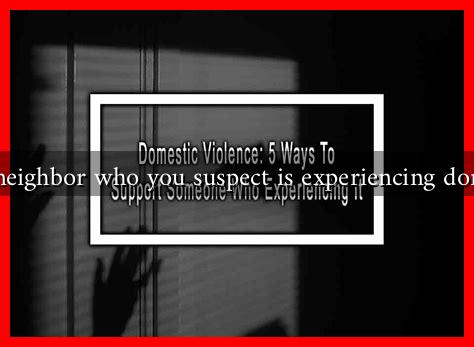-
Table of Contents
How to Help a Neighbor Who You Suspect is Experiencing Domestic Violence
Domestic violence is a pervasive issue that affects millions of individuals and families across the globe. It often occurs behind closed doors, making it difficult for friends, family, and neighbors to recognize the signs and intervene. If you suspect that a neighbor is experiencing domestic violence, it is crucial to approach the situation with sensitivity and care. This article will provide you with practical steps to help your neighbor while ensuring their safety and well-being.
Recognizing the Signs of Domestic Violence
Before you can help, it’s essential to understand the signs of domestic violence. These can include:
- Frequent injuries or unexplained bruises.
- Changes in behavior, such as withdrawal from social activities.
- Signs of fear or anxiety around a partner.
- Overly controlling behavior from a partner, such as monitoring phone calls or restricting social interactions.
- Frequent calls to the police or disturbances reported from the residence.
According to the National Coalition Against Domestic Violence (NCADV), approximately 1 in 4 women and 1 in 9 men experience severe intimate partner physical violence. Recognizing these signs can be the first step in providing support.
Approaching the Situation with Care
When you suspect a neighbor is experiencing domestic violence, it’s vital to approach the situation delicately. Here are some steps to consider:
- Build Trust: Establish a rapport with your neighbor. Engage in casual conversations to create a sense of trust and safety.
- Be Observant: Pay attention to any changes in their behavior or physical appearance that may indicate distress.
- Choose the Right Moment: If you decide to approach them, do so when they are alone and in a safe environment.
How to Offer Support
Once you feel comfortable approaching your neighbor, consider the following ways to offer support:
- Listen Without Judgment: If your neighbor opens up about their situation, listen empathetically without placing blame or making judgments.
- Provide Resources: Share information about local shelters, hotlines, and support services. The National Domestic Violence Hotline (1-800-799-7233) is a valuable resource.
- Encourage Professional Help: Suggest that they speak with a counselor or therapist who specializes in domestic violence.
- Offer Practical Help: If they need assistance, offer to help with errands, childcare, or even a safe place to stay if necessary.
Understanding the Risks
It’s important to recognize that intervening in a domestic violence situation can be risky. Victims may feel trapped and fearful of their abuser’s reaction. Here are some considerations:
- Respect Their Autonomy: Understand that the decision to leave an abusive relationship is ultimately theirs to make.
- Avoid Confrontation: Do not confront the abuser directly, as this could escalate the situation and put your neighbor in greater danger.
- Be Patient: Change takes time. Your neighbor may not be ready to leave their situation immediately.
Case Studies and Statistics
Research shows that community involvement can significantly impact the lives of domestic violence victims. A study published in the Journal of Interpersonal Violence found that neighbors who intervened or offered support helped reduce the severity of violence in some cases. Furthermore, communities with active support networks saw a decrease in domestic violence incidents.
Statistics from the NCADV indicate that nearly 20 people per minute are physically abused by an intimate partner in the United States. This staggering number highlights the importance of community awareness and intervention.
Conclusion
Helping a neighbor who you suspect is experiencing domestic violence requires sensitivity, patience, and a willingness to listen. By recognizing the signs, approaching the situation with care, and providing resources and support, you can make a significant difference in their life. Remember, while you can offer help, the decision to leave an abusive relationship is ultimately theirs. Your role is to be a supportive ally, ensuring they know they are not alone in their struggle.
For more information on domestic violence and how to help, visit the National Coalition Against Domestic Violence.

